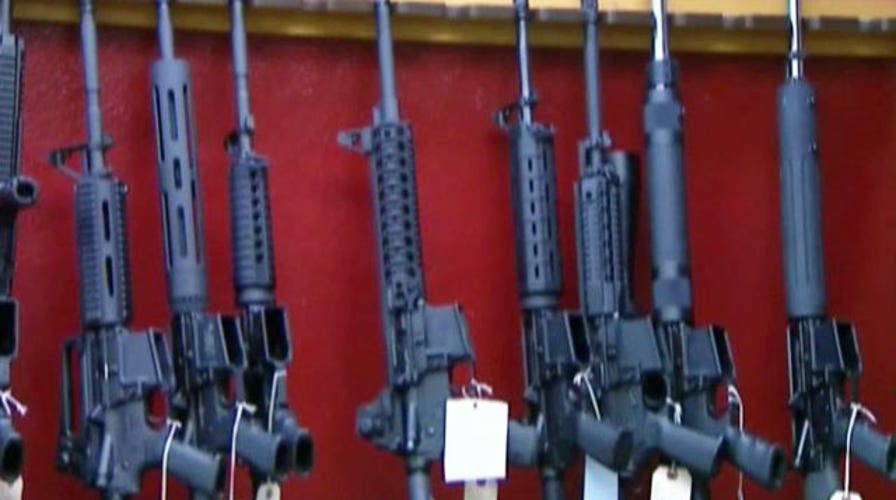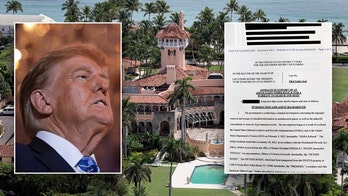This is the latest in a Fox News series examining the controversy over gun violence and gun control.
It is the first line of defense against crime guns: the background check.
Representing one of the few limits on Americans' Second Amendment rights, the system has been in place since 1998 and is used to screen millions of gun buyers every year. The Senate Judiciary Committee will examine those rules Wednesday when it begins to hash out new gun control legislation.
But while polls show more than 90 percent of Americans support a universal check on all gun sales, few know what that means, how it works or if such checks actually reduce crime.
Though 14 years old, and an invaluable resource used by every state to screen upwards of 10 million gun buyers annually, the National Instant Criminal Background Check System (or NICS) remains a grossly incomplete patchwork of records. According to federal audits, the NICS is lacking millions of records that would prevent guns from getting into the wrong hands.
"I don't think anyone who is rational has a problem with the NICS check," said Arizona lawyer and gun-rights expert Tim Forshey. "But is there room for improvement? Absolutely."
The problems with the current background-check system will be a challenge to lawmakers as they try to overhaul how gun buyers are screened.
The idea behind the current system is simple enough. "It's a very easy form with some very specific instructions," said Aaron Jeffrey, a salesman at Turner's Outdoorsman, one of California's largest gun outfitters. "This is to make sure that you don't have anything prohibiting in your past that would keep you from owning a firearm. Drug-related charges, violent misdemeanors, felonies, restraining orders, things of that nature."
Sen. Richard Blumenththal, D-Conn., in pushing for new legislation, told reporters last week that any new system should include checks on "all firearms sales, not just licensed dealers" -- to include gun shows, private sales and sales of ammunition.
Background checks are performed by the NICS, which is run by the FBI.
Currently, all states require a NICS check on weapons sold at gun stores, but 29 states do not require one at gun shows. A bill proposed by Sen. Dianne Feinstein, D-Calif., would require a background check on all gun sales or transfers, including those between friends and family and those over the Internet and through classified ads.
Individuals who want to buy a gun are required to fill out form 4473 -- which is effectively an application to the federal government to buy a weapon. After taking five minutes to complete, the form is sent electronically to the NICS database in Clarksburg, W.Va. By law, buyers whose names show up on the FBI database can't buy a gun and their application is rejected. They include:
- Felons
- Fugitives from justice
- Anyone who unlawfully uses any illegal drug, including marijuana
- The mentally ill (as determined by a court) or someone who has been committed to a mental institution
- Illegal aliens
- Those dishonorably discharged
- Anyone who renounced U.S. citizenship
- Those under a restraining order for harassment, stalking or threatening a partner
- Those convicted of domestic violence, including misdemeanors
But audits have confirmed the execution of this system is spotty. The two areas most lacking in terms of NICS record-keeping are drug use and mental illness, despite an emphasis after a student treated for mental illness killed 32 students at Virginia Tech in 2007.
A 2012 Government Accountability Office review noted that the government set out to provide "incentives for states to make more records available for use during firearm related background checks" in the wake of that tragedy.
The 55-page report went on to blast the states and federal government for failing to meet congressional expectations.
It found, out of 1.1 million mental health records submitted from 2004 to 2011:
- 23 states and the District of Columbia had submitted fewer than 100 mental health records to the federal database.
- 17 states had submitted fewer than 10 mental health records.
- Four states had not submitted any.
Currently, gun purchases are prohibited for anyone found not guilty by reason of insanity, involuntarily committed to a mental institution by a court or found legally incompetent. Lawmakers in many states want that expanded -- to those under treatment for mental instability, or those released from treatment or a hospital because of medication. Police fear the moment someone goes off their medication, they can become unstable. Therefore these individuals, while not committed, should not be allowed to buy a gun.
Like mental health records, the GAO found drug violations are also under-reported. The agency said most states are not informing the FBI of failed drug tests, as the federal background check law requires. It found:
- 44 states had submitted fewer than 10 records to the NICS controlled-substance file.
- 33 states had not submitted any records even though the law bars anyone with multiple arrests for drug use or possession within the past five years, or those convicted for use or possession within the last year, including marijuana. Yet the report found states with lengthy registries of medical pot smokers did not provide that information to the NICS system.
"Available data suggest that most states are not making these records available," the GAO audit said. Additionally, it said, "On May 1 2012, DOJ data showed 30 states were not making non criminal (drug test results) records available."
It is not for lack of money. Under the NICS Improvement Amendments Act, Congress provided the federal government both a carrot and stick to prod states into compliance, giving the Department of Justice authority to give and take money away from states that did not cooperate. The GAO audit found the DOJ doled out more than $25 million in grants but did not penalize one state for non-compliance.
"DOJ has not administered the reward and penalty provisions of the NICS Improvement Amendments ACT," the report said.
Nevertheless, NICS performs millions of checks every year, and usually in under two minutes. In 2010, the agency reviewed more than 6 million 4473 forms. Just 72,142 were denied the right to buy a gun.
Among those denials, 47 percent were rejected because of a felony indictment or conviction. Yet, just 44 were prosecuted, and 13 convicted of lying on their 4473 form, according to a report prepared for the DOJ by the Regional Justice Information Service in 2012. That represents just .0002 percent of all denials, and an even smaller percentage of the total number of background checks.
While the background check does deny guns to criminals, very few are punished for trying. And while a majority of lawmakers appear to support the system, there are lingering questions over to what extent it prevents crime. According to a 2000 report published in The Journal of the American Medical Association, researchers found rates of homicide and suicide were not significantly different in states that had implemented the checks versus states that had not.





